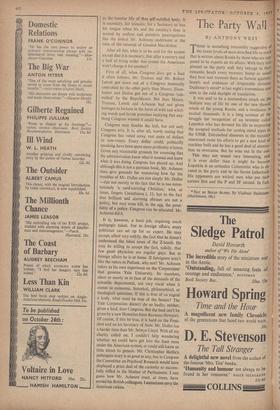The Party Wail
By ANTHONY WEST
THERE is something irresistibly suggestive Of the lower levels of semi-detached life in much that is written about Russia by those who are sulY posed to be experts on its affairs. With their ears pressed to the party wall they enlarge in their romantic heads every murmur, bump or sound they hear and transmit them as furious quarrels, brawls and evidences of irreparable division. Dudintsev's novel* is last night's tremendous row seen in the cold daylight of translation.
It was said to be a tremendous attack on the Stalinist way of life by one of the new thawed minds of the young Russia, and a revelation to excited thousands. It is a long account of the struggle for recognition of an inventor called Lopatkin who has devoted his life to improving the accepted methods for casting metal pipes it' the USSR. Entrenched elements in the ministrY concerned resist his efforts to get a new kind of machine built and he has a good deal of obstruc- tion to overcome. But he wins out in the end.
This may not sound very interesting, and it is even duller than it might be because Lopatkin is an orthodox Commtmist who is de- voted to the party and to the Soviet fatherland. His opponents are wicked men who put their careers first and the P and SF second. In fact,
* NOT By BREAD ALONE. By Vladimir DUdillISCV• (Hutchinson, 18s.)
SO far as the book is an attack on anyone, it is an attack on precisely the kind of timid bureau- crat who has been under attack in the official Russian press and at the Party Congresses since the very earliest days. Such `fearless' criticism has alWays been a favourite Russian device for diverting attention from shortcomings of the 1),rtY's plans by sacrificing a few expendable members. Lopatkin's struggle is not with the stem, but with careerists and philistines who abuse it and stand between it and perfection. Ks heroism and his devotion to better pipe cast- ing Is absolutely safe Soviet orthodoxy and his enemies are the hallowed aunt sallies who have bee.n battered by a generation of licensed satirists.
The novel bears a very close resemblance to such American best sellers as Cash Macall and 1')/irs Sincerely, Willis Wade, which safely attack the aspects of business practice which all busi- nessmen condemn because the public dislike them. They were read and liked by precisely that se:non of the American public which is happiest 1Y1111 America as it is and who show their liking fOr their society by wishing to remove what they consider to be its few imperfections. The tradition 0f this kind of pseudo-protest literature goes back to. Dickens, who set its form with Nicholas ckleby, an attack on an evil which had already been exposed, and about which there was strong and unmistakable public feeling. Floating serenely th the tide, Dickens launched his attack on Squeers and his family, characters so grotesque gilt no living or dead schoolmaster could pos- sibly see himself as a target or feel a wound. The th318 which Squeers, Cash Macall, Willis Wade, and Dudintsev's villains all have in common is that they are quite certainly, whoever the reader 'flay be, someone else, members of another depart- 41t, another Ministry, or another profession. These bold defences of received ideas against fa.'I eless and unreal menaces are skilfully desIgned to challenge nobody, and as all the message that can conceivably be read into Not )( by Bread Alone is that industrial managers Ought to be keener on technical progress, it can hardly be taken, as we are asked to take it, as a revolutionary challenge likely to shake the regime to its foundations. It looks, on the contrary, as if the book was aimed at a reading public very like that constituted by the American book society and lending library public; a good big solid mass near the centre which does not like to think very Profoundly about matters which might disturb its llingness to settle for things as they are with a minor adjustment here and there. If it were an American novel we would say that its character
ts conformist and it seems to show that the society which it has produced is in a placid rather than in a dynamic mood.
Considered as a novel it is a singularly un- Mipired production : it trundles on towards a Predictable end, and there is always a distinctly seen reader between the sights, a simple, good- natured person who wants to have all the ques- tions answered by the time he gets to the end of the story. With its plausible technical background, and its refusal to meddle with any imaginative Or psychological nonsense, it might be recom- Mended as a stop-gap to those who are waiting fOr another novel from Mr. Nevile Shute. But it
.11 only just do even in that domain.























































 Previous page
Previous page